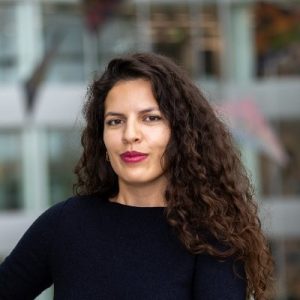
Esmé Bosma obtained her PhD at the Department of Political Science the University of Amsterdam. She holds a bachelor’s and master’s degree in Political Science in which she specialised in European security politics. Her PhD research is situated at the intersection of Science and Technology Studies (STS) and (critical) security studies. Her focus is on how private actors absorb an increasing amount of security responsibilities and what kind of ethical, technical and practical dilemmas arise in doing so. By doing ethnographic fieldwork in banks and the financial sector she studied how European banks and financial institutions counter terrorist financing in practice.
Being gatekeepers of the financial system, banks have the legal obligation to ‘Know Your Customer’ before offering their services and to report unusual or suspicious transactions to Financial Intelligence Units (FIUs). She analysed how financial institutions translate these regulatory requirements into practical processes and protocols. Her thesis explores how political and ethical choices materialise at the human-technology interface and analyses the production of customer risk profiles, the design and use of transaction monitoring systems, and the emergence of public-private partnerships to counter terrorist financing.
